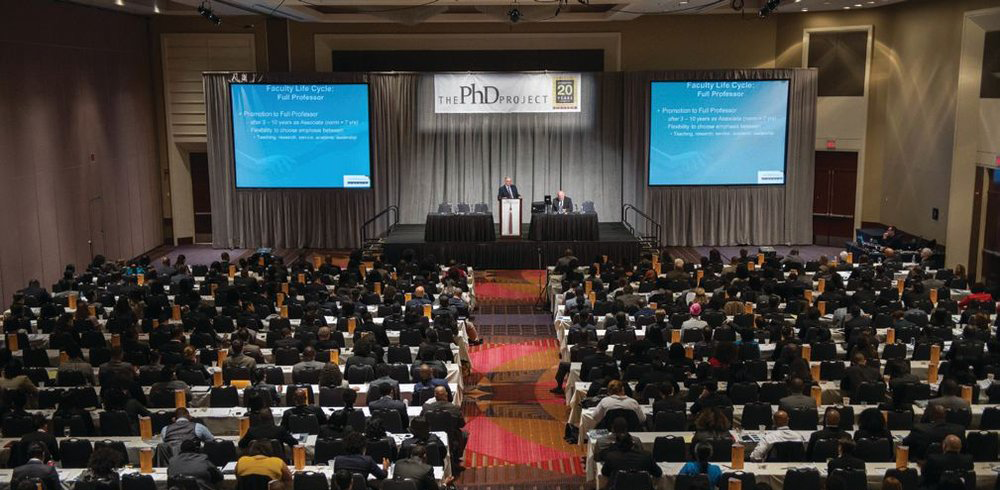The PHD Project
ADDRESSING THE NEED FOR A MORE DIVERSE TALENT PIPELINE: THE PHD PROJECT

Over 20 years ago, The KPMG Foundation, which invests in business education and volunteerism, started a national program called The PhD Project to increase the diversity of business school faculty. To date, minority business faculty has increased from fewer than 300 to 1,312 with another 296 in doctoral programs in the U.S. The Project attacks the root cause of minority underrepresentation in corporate jobs: Historically, very few minority college students study business as an entrée to a corporate career. Diversifying the faculty attracts more minorities to study business and better prepares all students to function in a diverse workforce.
As a national program, hundreds of participating colleges and universities have already improved the diversity of their faculty.
“Minority faculty are a magnet for minority students,” championed by State University of New York System Chancellor Nancy Zimpher.
Each year, highly qualified minority professionals who are considering leaving their careers to enter Ph.D. programs in business are invited to The PhD Project Conference. Deans, professors and current minority doctoral students are able to share and discuss the benefits of pursuing a business doctoral degree full-time. Conference participants are also provided with the tools and resources needed to apply for doctoral programs.
Once admitted, every minority business doctoral student in a U.S. business school accredited by the Association to Advance Collegiate Schools of Business becomes a member of one of five Doctoral Student Associations (DSAs) in accounting, finance, information systems, marketing or management
Diversifying the faculty attracts more minorities to study business.
An annual conference is held for each of the DSAs for doctoral students to come together and form a strong support network while receiving important tools to help them navigate their doctoral programs. It is this support network that ensures Project doctoral students will complete their programs—and over 90 percent of them do.
Approximately 35 percent of The Project’s $2.3 million annual budget is provided by The KPMG Foundation while universities, dean and faculty organizations, and forward-thinking corporate leaders contribute the remaining funds.
“The PhD Project can work wonders for recruiting top tier talent,” said Luke Visconti, CEO, Diversity Inc. “As a sponsor, there are so many connections you can make. For example, we have used PhD Project professors to moderate the discussions at our events. There’s nothing like having a room full of b-school professors to add sophistication and authority to an event.”
The PhD Project Sponsors not only help to diversify the future workforce, but also reap the benefits of helping their own bottom line.
“The PhD Project is one of a core group of partners the Citi Foundation has sponsored for over 20 years because of the impact we have seen, the value it brings, and because of its close alignment to our mission,” said Ana Duarte Mc- Carthy, director of global workforce diversity, Citi Foundation. “In shaping the diversity of faculty in business schools, The PhD Project creates an inclusive leadership culture that may better inspire young minorities to consider going to business school. This, in turn, creates a pipeline for Citi, and others in the finance industry, that are focused on ensuring our talent leadership looks like the communities we serve.”
Triggered by minority student unrest in early 2016, four universities announced aggregate funding of over $200 million to address the need for faculty diversity. The underlying reason behind the funding is supported by research indicating that minority students are unable to perform to their full potential when the environment is made uncomfortable or unfavorable for them to do so. Typically in these cases, few, if any, minority faculty or administrators are present and available for students to consult.
“Studying this problem of under-performance has morphed into solving the diversity problem,” stated Dr. Claude Steele, executive vice chancellor and provost, University of California, Berkeley. “It’s one thing to numerically integrate a setting. It’s another thing to make that place one where everyone feels comfortable and can flourish.”
Chip Raymond, former president of the Citi Foundation, lauded The Project among similar programs aimed at attracting minority students to post-secondary studies.
“The PhD Project is the linchpin to making all of the access programs more successful,” he said.
The PhD Project model is unique to business and minorities. However, for other disciplines, it may also show a way to meet the gathering faculty hiring crisis. Participants partner with appropriate professional organizations to market an academic career in that field. Such collaborations can help attract, pre-qualify, prepare and provide support for the doctoral students – tomorrow’s professors.
THE PHD PROJECT SPONSORS
The PhD Project has received ongoing support from its sponsoring companies, participating universities and organizations, and supply alliance members. Its founding organizations, in addition to The KPMG Foundation, are the Graduate Management Admission Council, Citi Foundation, AACSB International. The leading corporations, foundations and associations funding it include over 300 participating universities, AICPA Foundation, Diversity Inc., Dixon Hughes Goodman LLP, Rockwell Collins, Wal-Mart Stores, Inc., American Marketing Association, John Deere Foundation, CIGNA, ADP, Edison International (on behalf of the California State University System), Lincoln Financial Group, Aerotek/ TEKsystems (operating companies of Allegis Group), American Accounting Association, The Hershey Company, Academy of Management, NASBA and OCWEN.
FOR MORE INFORMATION
For more information on The PhD Project, visit phdproject.org. Connect with our members: MyPhDNetwork.org
thephdproject
@ThePhDProject









